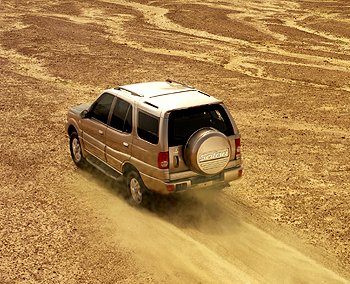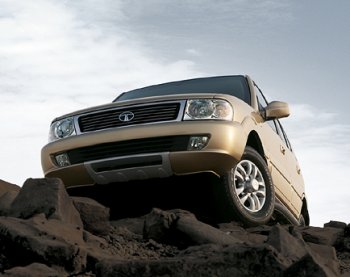|
The
manufacturing alliance between Fiat Auto and Tata Motors is
unfolding rapidly with Fiat Autom˛veis now testing the Tata
Safari in Brazil with the SUV expected to be built alongside
a new pick-up in Argentina.
Earlier this year it was revealed that Fiat and Tata Motors
were investigating building a pick-up at the former's
underused car plant at Cordoba in Argentina, as part of an
in-depth study into areas in which the two companies could
strategically cooperate. Production of the Fiat Palio
hatchback at the Cordoba plant ceased a few years ago when
the Argentinean economy faltered and the moribund plant now
just produces some mechanical components. Last week it was
confirmed during the Fiat Investor Presentation at Lingotto
that a 1-ton pick up would be assembled at the plant, and
badged by both Fiat and Tata. Initial production is slated
for 25,000 units per year with the launch date set for the
second half of 2008. The pickup will also be exported to
Europe where it will be sold under the Fiat brand name.
Alongside the pickup, Fiat are currently evaluating to
practicality of building the Tata "Safari" SUV. Several
Safari models are now busy pounding the roads around Fiat
Autom˛veis' Betim factory in the Minas Gerais region. The
new 1-ton pickup vehicle is expected to be built on the
Safari's architecture so excellent economies of scale can be
achieved by assembling both models at the Cordoba factory.
The Tata Safari model was first launched in 1998 as a 90 bhp
turbodiesel SUV, but weighing more than 2,000 kg it was
regarded as quite underpowered. A facelift last year
addressed this overriding issue by incorporating the option
of Tata's DICOR (Direct Injection Common Rail) commercial
engine.
|
 |
|
The Tata Safari is 4810 mm long, 1918 mm wide, 1925
mm high and with a wheelbase of 2650 mm. Its
off-road capable suspension features independent
double wishbones with torsion bar at the front, and
coils springs with 5 links at the rear. |
|
|
 |
|
The manufacturing alliance between Fiat Auto and
Tata Motors is unfolding rapidly with Fiat
Autom˛veis now testing the Tata Safari in Brazil
with the SUV expected to be built alongside a new
pick-up in Argentina. |
|
|
DICOR is a 2956cc in-line, 4-cylinder unit that is able to
develop 115 bhp at 3,000 rpm, and 290 Nm of torque in the
range of 1,600 to 2,000 rpm. The DICOR engine was sourced
for the Safari from the Tata 407, a truck from the Tata
Motors commercial range.
The Tata Safari is 4810 mm long, 1918 mm wide, 1925 mm high
and with a wheelbase of 2650 mm. Its off-road capable
suspension features independent double wishbones with
torsion bar at the front, and coils springs with 5 links at
the rear. It has ventilated disc brakes at the front and
drums at the rear, and 235/75 R 16 tyres fitted all round.
It also has a 6 metre turning circle and a 65 litre fuel
tank. The top specification model, fitted with the the DICOR
power unit, has seven seats and comes with a range of
features including roof lining and rear-of-seat located LCD
monitor screens, a DVD player, a compact refrigerator and
multi-zone heating.
However the Safari is a heavy SUV: the 2WD version weighs
2,115 kg, with with the 4x4 option incorporated it comes in
even higher at 2,225 kg. This excessive weight is believed
to be concerning the Fiat Autom˛veis engineering development
team, as well as the suitability of the DICOR engine to the
South American market. Their attention is expected to focus
on reducing the SUV's weight before it enters production at
Cordoba, while replacing the DICOR unit with one of Fiat's
own common rail turbodiesel engines is also a likely
scenario.
|
|
|
|
![]()
![]()